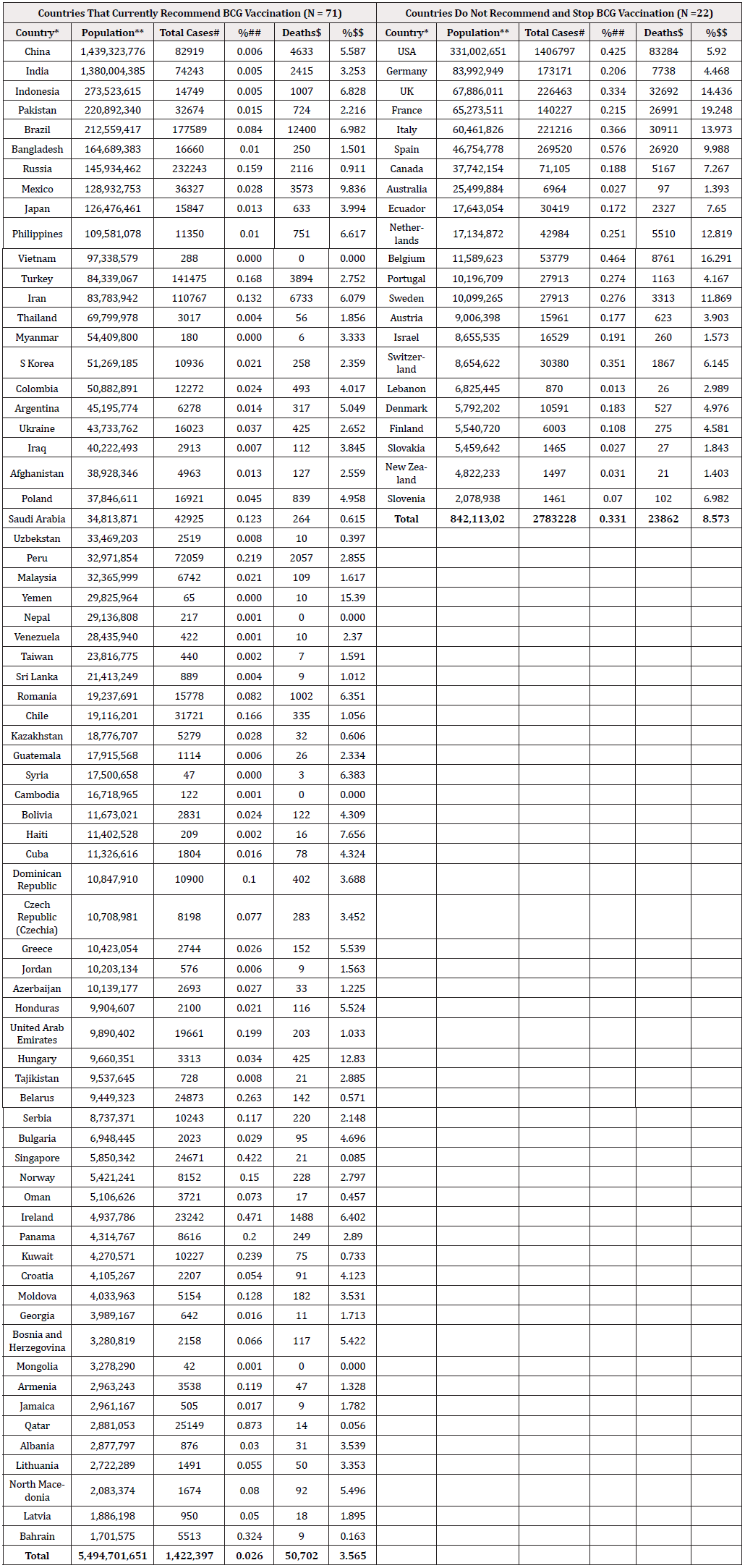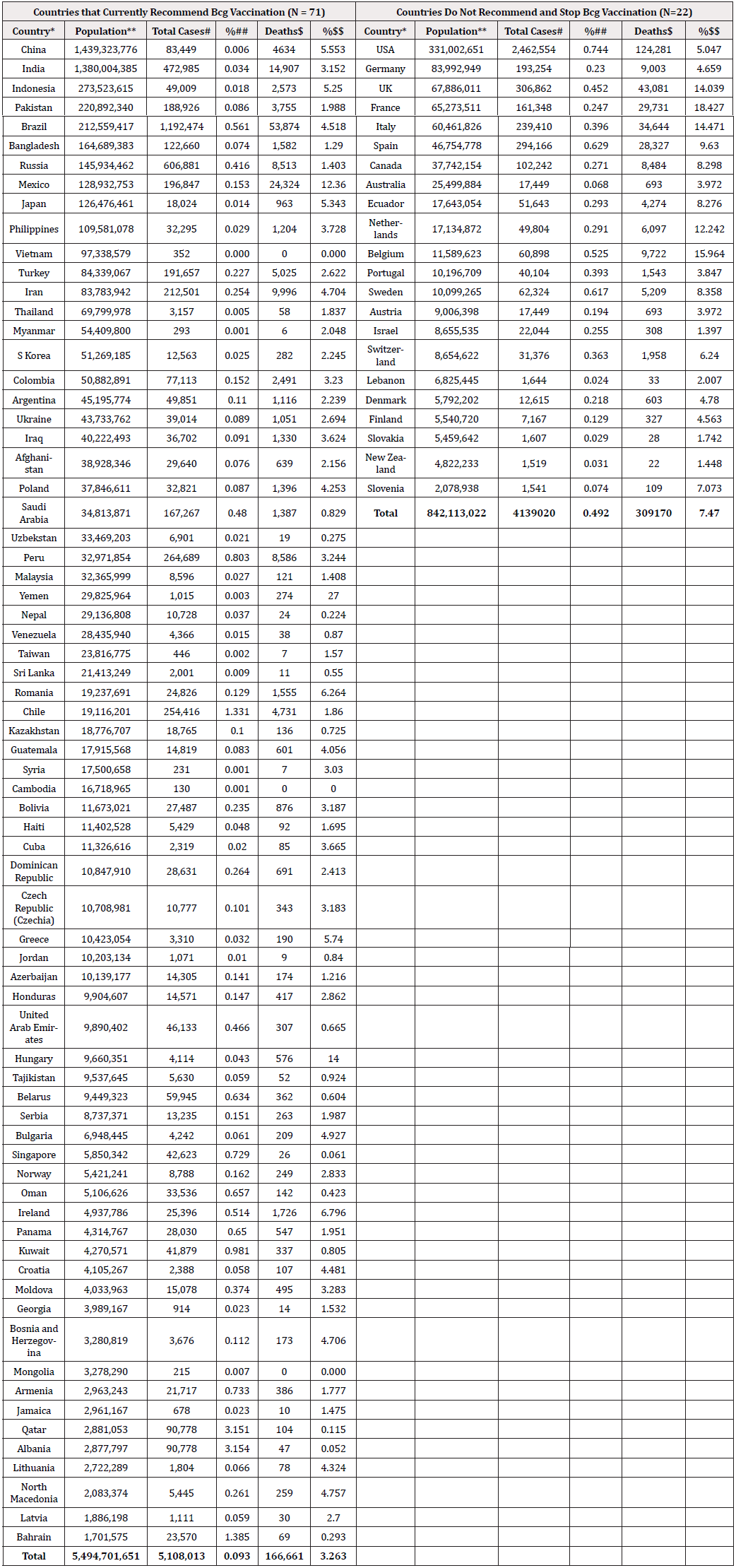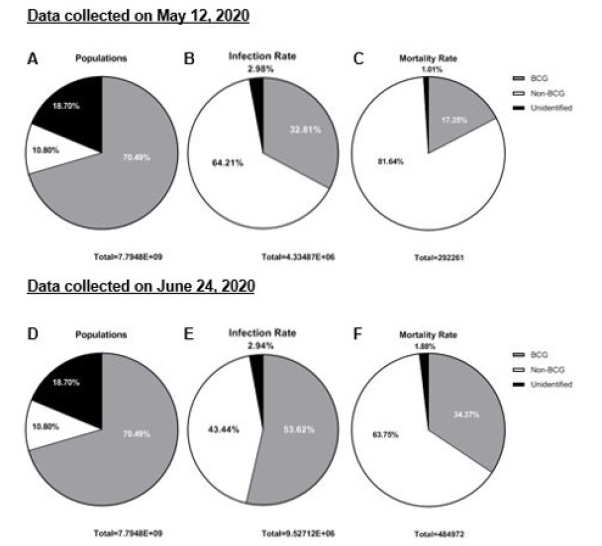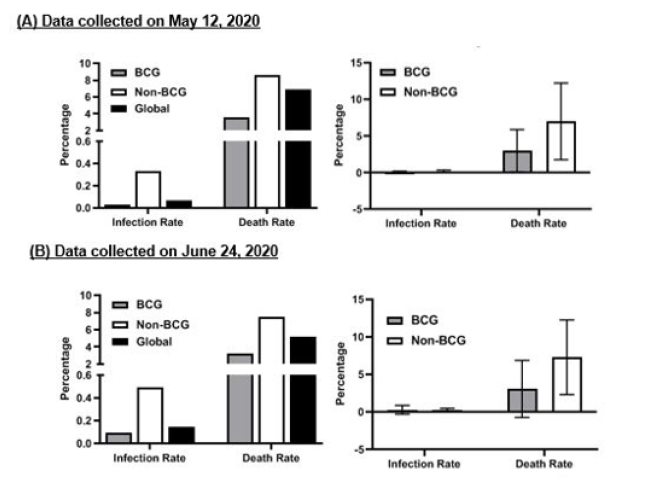Short Communication 
 Creative Commons, CC-BY
Creative Commons, CC-BY
BCG Vaccine in Relation To COVID-19 Morbidity and Mortality
*Corresponding author: Mohamed I. Husseiny, Department of Translational Research & Cellular Therapeutics, Diabetes & Metabolism Research, Institute, Beckman Research Institute of City of Hope National Medical Center 1500 East Duarte Rd, Duarte, California, USA.
Received: October 23, 2020;Published: November 20, 2020
DOI: 10.34297/AJBSR.2020.10.001579
Introduction
The COVID-19 pandemic caused by severe acute respiratory syndrome coronavirus-2 (SARS CoV-2) significantly interrupts daily life activities leading to global social and economic disruption. The infected cases and deaths due to COVID-19 are continuously rising. The lower incidence of COVID-19-cases among countries with Bacillus-Calmette-Guérin (BCG) vaccination background raises the possibility that BCG vaccine could be a protective against COVID-19. Here, we studied the prevalence of COVID-19-cases in relation to population received BCG vaccination. The collected data were compared at two different time points for proper validation and execution of appropriate association. Our investigations showed a correlative association between BCG vaccination and the number of COVID-19-cases. The association obtained can be supported by the fact that BCG vaccination is associated with an increase in trained immunity. This condition has been used previously to establish a protective effect by BCG vaccine against infections due to pathogens other than Tuberculosis (TB). The data obtained from this study could encourage the ongoing clinical studies regarding the use of BCG vaccine against COVID-19.
Keywords: COVID-19 pandemic, BCG vaccination, Tuberculosis (TB); SARS-CoV-2, Infection Rate, Mortality Rate
The Inflammaging
Coronavirus disease 2019 (COVID-19), a newly emerged global pandemic, caused by SARS-CoV-2 has caused significant fatality. Most patients with COVID-19 exhibit mild to moderate symptoms, while 5% eventually develop acute respiratory distress syndrome (ARDS) and/or multiple organ failure leading to death [1,2]. There’s currently no treatment approved for COVID-19, although vaccines and drugs are currently under study. One of the options under trial is the use of Bacille-Calmette-Guérin (BCG) as potential protection against COVID-19.
BCG, a live attenuated Mycobacterium bovis introduced in 1921, is mainly used against tuberculosis, leprosy and other non-tuberculous mycobacteria such as buruli ulcer [3-5]. Several studies have suggested the use of BCG vaccine as an effective treatment for acute respiratory tract infections [6,7]. This suggestion is attributed to the findings that BCG can decrease the level of virus in infected patients. A recent study demonstrated that countries with a mass BCG vaccination policy exhibits less COVID-19 cases than non-BCG vaccinated countries. This has raised the hope that vaccination with BCG may confer protective effects against COVID-19 infection caused by SARS-COV-2. However, the data supporting this hypothesis is still lacking. To test the validity of such hypothesis, a correlation of the epidemiological data from BCG vaccinated versus non-vaccinated populations with the prevalence of SARS-CoV-2 infection and mortality rates is needed. Interestingly, WHO is currently studying this hypothesis including several clinical trials on selected cohorts.
Randomized controlled trials conducted earlier have provided evidence that BCG may protect against respiratory infections [3]. The beneficial effects of the BCG vaccine can include the induction of metabolic and epigenetic changes that enhance the non-specific activation of innate immune cells [8,9]. The mechanism of immune activation induced in response to BCG vaccination can be classified as antigen-dependent and antigen-independent mechanisms. In the case of antigen-dependent mechanism, BCG vaccine enhanced both innate and adaptive immune responses by activating macrophages, dendritic cells, neutrophils, memory B and T cells [9,10]. Since the bacterial antigens are different from viral antigens, this mechanism is unlikely in the case of SARS-CoV-2. In the case of antigen-independent mechanism, the effect of BCG vaccine is due to the non-specific effect on the innate immunity. The bystander B and T cells are activated, and this activation can lead to long-term activation of innate immune cells, termed as trained immunity [9]. The non-specific effect of trained immunity by BCG vaccine is more likely the one with potential role against SARS-CoV-2 infection.
Important features of the trained immunity are that it occurs through epigenetic reprogramming of monocytes at the site of infection. These monocytes undergo histone modification at promoter sites of genes encoding inflammatory cytokines, leading to long-term changes in their ability to respond to novel stimuli and resulting in an increasingly active immune response when they are re-activated [11]. It has been reported that BCG immunized population exhibits an increase in the quantities of cytokines including IL-1β, IL-6, IFNγ and TNF, compared to non-BCG immunized population [12,13].
It has been observed that SARS-CoV-2 infection triggers a local immune response, recruiting macrophages and monocytes, releasing cytokines, and priming adaptive T and B cell immune responses. In most cases, the infection resolves on its own, however, in some cases, a dysfunctional immune reaction occurs [14]. In the case of BCG vaccination, the human body seems to adapt to accept excessive levels of cytokines due to enhanced trained immunity to fight against pathogens, in particular those affecting the respiratory tract such as SARS-CoV-2 [15,16]. Therefore, we assume that an appropriate dose and controlled delivery of BCG vaccine can give some form of protection against COVID-19. To achieve this aim, currently, four clinical trials are ongoing in Australia, Netherland and USA to determine if BCG vaccination can potentially protect healthcare workers during the COVID-19 pandemic [17-19].
Association Between BCG Vaccination and Prevalence Of COVID-19 Infection and Mortality Rates
In this study, we hypothesized that countries which adopted a mass BCG vaccination policy are protected from infection with SARS-CoV-2 contrary to countries that did not adopt the same policy or stopped it. We specifically compared the death rates between the countries that have employed mass BCG vaccination and the countries which stopped or did not employ mass BCG vaccination policy. Data were collected for 71 countries that adopted mass BCG vaccination and 22 countries did not employ or stopped mass BCG vaccination (Table 1,2) using the BCG Atlas published in 2011 [20]. We excluded the African countries from our study due to lack of accourate information about COVID-19 cases. The data regarding the population was obtained from the World Population Clock [21]. The information on the number of COVID-19 cases and deaths was retrieved from the World Population Clock on two different time points, May 12, 2020 and June 24, 2020 and listed in Supplementary (Table 1,2).

Table 1: Comparison of total positive cases for COVID-19 and deaths in population of countries adopted mass BCG vaccination policy and with those that did not adopt or stop mass BCG vaccination policy.
Data have been collected on May 12, 2020 from https://www.worldometers.info/coronavirus/ *Countries collected from https://www.worldometers.info/world-population/population-by-country/ **Population of each country collected from https://www.worldometers.info/world-population/population-by-country/ # Total cases are the COVID-19 positive until May 12, 2020 collected from https://www.worldometers.info/coronavirus/ ## % are the percentage positive cases of COVID-19 to the total number of populations $ Death is the total number of deaths infected with COVID-19 until May 12, 2020 collected from https://www.worldometers.info/coronavirus/ $$ % is the percentage of the deaths to the total number of positive COVID-19 @ Countries adopt mass BCG vaccination as single or multiple doses @@ Countries did not adopt mass BCG vaccination or stop it BCG vaccine is recommended as single or as multiple doses, http://www.bcgatlas.org/

Table 2: Comparison of total positive cases for COVID-19 and deaths in population of countries adopted mass BCG vaccination policy and with those that did not adopt or stop mass BCG vaccination policy.
Data have been collected on June 24, 2020 from https://www.worldometers.info/coronavirus/ *Countries collected from https://www.worldometers.info/world-population/population-by-country/ **Population of each country collected from https://www.worldometers.info/world-population/population-by-country/ # Total cases are the COVID-19 positive until May 12, 2020 collected from https://www.worldometers.info/coronavirus/ ## % are the percentage positive cases of COVID-19 to the total number of populations $ Death is the total number of deaths infected with COVID-19 until May 12, 2020 collected from https://www.worldometers.info/coronavirus/ $$ % is the percentage of the deaths to the total number of positive COVID-19 @ Countries adopt mass BCG vaccination as single or multiple doses @@ Countries did not adopt mass BCG vaccination or stop it BCG vaccine is recommended as single or as multiple doses, http://www.bcgatlas.org/
To reveal the efficacy of BCG vaccination in protection against SARS-CoV-2 infection, we analysed the global percentage of BCG vaccinated population and the current COVID-19 death rates. (Figure 1A) showed that approximately 70% of the total population, included in this investigation, were adopted BCG vaccination, whereas ~11% of the total population were not or stopped BCG vaccination. Approximately 19% of the total population remains unidentified and excluded from the analysis due to lack of data or other factors. Interestingly, a correlative association was noticed since 64% of COVID-19 cases were documented in the non-BCG vaccinated population, while only 33% of COVID 19 cases were documented in BCG vaccinated population (Figure 1B). Another stark association was observed when mortality cases in both groups were considered. In the case of non-BCG vaccinated population, the mortality rate was 82%, whereas 17% mortality was observed in BCG-vaccinated population (Figure 1C). Similarly, a comparable trend was observed when the same measures were taken 42 days later on June 24, 2020. Within the same population (Figure 1D), 1.2 (Figure 1E) and 0.5 (Figure 1F) times the COVID 19 infected and dead cases were documented in BCG vaccinated population, respectively.
The infection rate within the countries that did not adopt mass BCG vaccination was ~13-fold those adopted mass BCG vaccination (Figure 2A). Similarly, the death rate in the countries that did not adopt BCG vaccination policy was 2.3 times those adopted mass BCG vaccination (Figure 2A). Data collected on June 24, 2020 showed that the infection and death rates within the countries did not adopt BCG vaccination were 5.3 and 2.3-fold those adopted BCG vaccination, respectively (Figure 2B). Although the infection rate was reduced, the death rate still similar to the data collected on May 12, 2020 and the overall trend indicating a correlative association between the BCG vaccination and reduction in COVID-19 cases.

Figure 1: Association between BCG vaccination and prevalence of SARS-CoV-2 infection and death at two different time points. (A-C) Data collected on May 12, 2020 and (D-F) Data collected on June 24, 2020. (A and D) Represnts the percentage of population that adopt mass BCG vaccination (BCG) versus those do not adopt mass vaccination (Non-BCG) in relation to the total population. (B and E) The percentage of the infected population that adopt BCG and not adopt BCG vaccination policy to the total infected number of collected countries. (C and F) The percentage of deaths due to COVID-19 in relation to population adopt BCG versus those not-adopt BCG vaccination. Unidentified is the population for african countries excluded from the study due to the lack of accurate information.

Figure 2: BCG vaccination in relation to COVID-19 infection and death rates at two different time points, (A) May 12, 2020 and (B) June 24, 2020. The percentage of infected population with SARS-CoV-2 that adopt mass BCG vaccination or not in relation to the total number of populations. Global infection is the percentage of the total infected population with SARS-CoV-2 to the total global population. Mortality rate is the rate of death due to the infected numbers in case of mass BCG / non-BCG vaccination. Global death is the portion of deaths to the overall SARS-CoV-2 infections.
BCG Vaccination Shall be an Important Factor In COVID-19 Incidence
During the current COVID-19 pandemic, suspected correlation has emerged between BCG vaccination and the spread of COVID-19. Countries like India, Pakistan, Russia, Japan, Vietnam, and Turkey, which are maintaining a mass BCG immunization program, have shown a lower incidence of COVID-19 cases, while countries like United States, Canada, UK, Spain, France, Netherlands, Belgium and Italy, which are discontinued the use of vaccine, have shown higher COVID-19 cases and mortalities. To support this further, Iran (started BCG vaccination in 1984) has shown a significant higher mortality rate among old-age population than those in China and India, who started this vaccination policy early in 1940s. Although an important factor could be the mass BCG vaccination policy followed by the countries showing lower SARS-CoV-2 infection rate [22], Other factors may be involved in this observation, including the low rate of testing, partial or full lockdown, social distancing and public adherence to these measures.
Other studies indicated similar correlations between BCG vaccinated countries and the reduced spread and severity of COVID-19 cases compared to higher mortality rate in case of countries without vaccination policy were reported [23, 24]. A recent study also noted that countries with a universal vaccination policy, such as Japan and Brazil, seemed to be impacted less by COVID-19 compared to those that did not, such as Italy, USA and Netherlands [25]. Though, this potential association lends a strong support to the notion that BCG vaccination could be a deciding factor in offering protection against SARS-CoV-2 infection. However, at the moment, this data needs to be cautiously endorsed in relation to other deciding factors including age, gender, ethnicity, obesity, and other co-morbidities that can be determinant in the infection outcome. Such data is currently not available and needs further investigations to get a clear picture of the prospective protection of BCG vaccination against SARS-CoV-2 infection. However, keeping in view a clear trend the notion that BCG vaccination affords preotection against SARS-CoV-2 infection demands further study to combat this deadly pandemic in both short and long terms.
Conclusion and Future perspectives
Our data analysis presented here is clearly indicated a potential association between BCG vaccination and COVID-19 prevalence. This pattern was further supported by several studies and the innate immunity mechanisms conferred by BCG vaccination. Despite these promising correlations, it is still early to draw a definitive conclusion and more experiments are required for proper validation. Furthermore, there are still questions to be addressed to justify the hypothesis supporting the protective action of BCG against COVID-19.
Countries like Australia and Germany which have no mass BCG immunization program showed lower morbidity and mortality rate due to SARS-CoV-2 infections. However, it could be due to imposition of early lockdown restrictions, young age of the infected cases, public adherence to social distancing procedure and most importantly the vigorous testing and contact tracing policies implemented by these countries. The innate immunity of people in low-income countries exposed to the high level of environmental pollutants compared to the developed world. Though not proved, climate and weather conditions could also play a part in the spread of the disease. Geographic location of countries may be a deciding factor too due to climate conditions.
Therefore, it is essential to devise models keeping in mind these variables to investigate the impact of BCG vaccination in relation to protection against COVID‐19. It would be interesting to observe if the protection against COVID-19 provided by BCG could be long lasting or will fade away with time and the age for vaccination. These can also help to devise new plans especially for countries who have abandoned BCG vaccination in the last couple of decades. Lastely, immunological and epidemiological studies supporting or opposing these correlations are necessary to be conducted to present a global consensus in the fight against COVID-19.
Authors Contribution
Rauf Bhat, Sameh Soliman, Ahmed Fahmy and Mohamed Husseiny: Conceptualization, Methodology, Data collection and interpretation, Drafting, reviewing and approval of the final version for submission, all authors attest they meet the ICMJE criteria for authorship.
Acknowledgements
No funding was obtained to conduct this overview.
Declaration of Competing Interest
The authors declare that they have no known competing financial interests or personal relationships that could have appeared to influence the work reported in this paper.
References
- Xu Z, Shi L, Wang Y, Zhang J, Huang L, et al. (2020) Pathological findings of COVID-19 associated with acute respiratory distress syndrome. Lancet Respir Med 8(4): 420-422.
- Huang C, Wang Y, Li X, Ren L, Zhao J, et al. (2020) Clinical features of patients infected with 2019 novel coronavirus in Wuhan, China. Lancet 395(10223):497-506.
- Hollm Delgado MG, Stuart EA, Black RE (2014) Acute Lower Respiratory Infection Among Bacille Calmette-Guérin (BCG)-Vaccinated Children. Pediatrics 133(1): e73-81.
- Coppola M, vanden Eeden SJF, Robbins N, Wilson L, Franken K, et al. (2018) Vaccines for Leprosy and Tuberculosis: Opportunities for Shared Research, Development, and Application. Front Immunol 9: 308.
- Phillips RO, Phanzu DM, Beissner M, Badziklou K, Luzolo EK, et al. (2015) Effectiveness of routine BCG vaccination on buruli ulcer disease: a case-control study in the Democratic Republic of Congo, Ghana and Togo. PLoS Negl Trop Dis 9(1): e3457.
- Moorlag S, Arts RJW, van Crevel R, Netea MG (2019) Non-specific effects of BCG vaccine on viral infections. Clin Microbiol Infect 25(12): 1473-1478.
- Lundgren F, Maranhao B, Martins R, Chatkin JM, Rabahi MF, et al. (2014) Vaccination in the prevention of infectious respiratory diseases in adults. Rev Assoc Med Bras (1992) 60(1): 4-15.
- Aronson JD, Aronson CF, Taylor HC (1958) A Twenty-Year Appraisal of BCG Vaccination in the Control of Tuberculosis. AMA Arch Intern Med 101(5): 881-893.
- Goodridge HS, Ahmed SS, Curtis N, Kollmann TR, Levy O, et al. (2016) Harnessing the beneficial heterologous effects of vaccination. Nat Rev Immunol 16(6): 392-400.
- Moliva JI, Turner J, Torrelles JB (2017) Immune Responses to Bacillus Calmette-Guérin Vaccination: Why Do They Fail to Protect against Mycobacterium tuberculosis? Front Immunol 8: 407.
- Kleinnijenhuis J, Quintin J, Preijers F, Joosten LAB, Ifrim DC, et al. (2012) Bacille Calmette-Guérin induces NOD2-dependent nonspecific protection from reinfection via epigenetic reprogramming of monocytes. Proc Natl Acad Sci U S A 109(43):17537-17542.
- Arts RJW, Moorlag SJCFM, Novakovic B, Li Y, Wang SY, et al. (2018) BCG Vaccination Protects against Experimental Viral Infection in Humans through the Induction of Cytokines Associated with Trained Immunity. Cell Host Microbe 23(1): 89-100.e5.
- Kleinnijenhuis J, Quintin J, Preijers F, Benn CS, Joosten LAB, et al. (2014) Long-lasting effects of BCG vaccination on both heterologous Th1/Th17 responses and innate trained immunity. J Innate Immun 6(2): 152-158.
- Felsenstein S, Herbert JA, McNamara PS, Hedrich CM (2020) COVID-19: Immunology and treatment options. Clin Immunol 215:108448.
- Garly ML, Martins CL, Balé C, Baldé MA, Hedegaard KL, et al. (2003) BCG scar and positive tuberculin reaction associated with reduced child mortality in West Africa: A non-specific beneficial effect of BCG? Vaccine 21(21-22): 2782-2790.
- Victora CG, Fuchs SC, Flores JAC, Fonseca W, Kirkwood B (1994) Risk Factors for Pneumonia Among Children in a Brazilian Metropolitan Area. Pediatrics 93: 977-985.
- Gardiner NCaK (2020) BCG Vaccination to Reduce the Impact of COVID-19 in Australian Healthcare Workers Following Coronavirus Exposure (BRACE) Trial. ClinicalTrials.gov Identifier: NCT04327206.
- (2020) UMC. BMaU Reducing Health Care Workers Absenteeism in COVID-19 Pandemic by Enhanced Trained Immune Responses Through Bacillus Calmette-Guérin Vaccination, a Randomized Controlled Trial (BCG-CORONA). ClinicalTrials.gov Identifier: NCT04328441.
- (2020) DiNardo JDCaA. Bacillus Calmette-Guerin Vaccination as Defense Against SARS-CoV-2: A Randomized Controlled Trial to Protect Health Care Workers by Enhanced Trained Immune Responses ((BADAS)). ClinicalTrials.gov Identifier: NCT04348370.
- Zwerling A, Behr MA, Verma A, Brewer TF, Menzies D, et al. (2011) The BCG World Atlas: a database of global BCG vaccination policies and practices. PLoS Med 8(3): e1001012.
- (2020) Worldometer WPC.
- Mehrotra K (2020) TB vaccine as anti-Covid candidate: what ICMR will study in BCG trial.
- P K (2020) Is BCG vaccine giving us immunity we talk about? Bangalore Mirror.
- Devi Dayal SG (2020) Connecting BCG Vaccination and COVID-19: Additional Data. MedRxiv.
- Prevention CfDCa. COVID-19 in Racial and Ethnic Minority Groups.



 We use cookies to ensure you get the best experience on our website.
We use cookies to ensure you get the best experience on our website.